The second Global Production Awards were held earlier this week in Cannes, with 13 competitive and one special recognition award handed out.
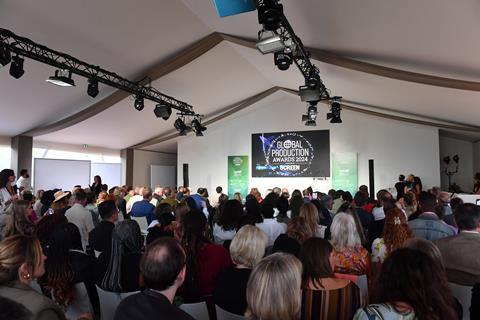
The Global Production Awards (GPAs) returned last night (May 20) to the Mademoiselle Gray d’Albion Plage for its second edition, bigger and brighter than last year’s inaugural event.
For the sophomore year (presented by Screen International, in association with sister brand KFTV), the sustainable production category was split into two — one for scripted and one for unscripted — while an award was added for virtual production innovation, reflecting the growing use of VP in filmmaking across the globe.
Recognising sustainable work across 13 categories, the GPAs anoint the best locations around the world, the standout studio facilities, creative crews and ideas, and what the very best locations and commissions can offer international and local productions.
This year’s special recognition accolade was presented to Bafta albert for the role it plays in reducing the environmental impact of productions.
The GPAs are open to all organisations and companies working in the film and TV industry — including studios, production companies, film commissions, locations, suppliers and manufacturers and any services involved in film and TV production.
The winners were chosen by an impressive roster of judges drawn from across the industry, including high-end TV and film producers, senior production executives and film commissioners. The judges took part in a series of lively debates, with each category receiving more entries than last year.
Universal, Warner Bros, Fremantle, BBC and Sky were among the companies shortlisted.
Our thanks to Gold Partner the British Film Commission; Silver Partners Brand South Africa, Calgary Economic Development, On-Set Locations and Screen Scotland. Thanks also to our Category Partner Dallas Film Commission, and Supporting Partner Olsberg.SPI and our In-Kind Partners AFCI, AFCNET and EUFCN.
Global Production Awards winners 2024
1. City of Film
Winner: Bristol, UK (Bristol City of Film)
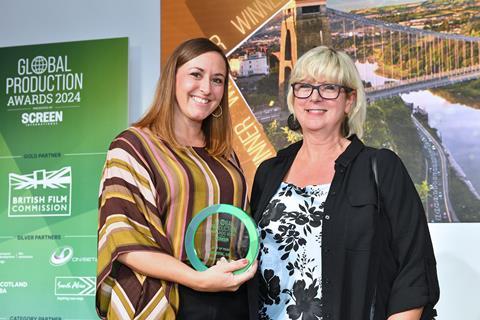
This coveted award reflected the global nature of production, with entries from cities across the world. It was awarded to a location that in recent years has helped deliver for TV and filmmakers and at the same time aided the development of local skills and expertise while boosting the local economy.
In winning the hearts and minds of the judges, Bristol’s entry demonstrated a record of creative and commercial success, helping to deliver great productions in the city, efficiently and effectively.
One judge heralded Bristol as being “deliberate in its efforts to growing the screen industries for social and economic value, as demonstrated through its offering”.
The city ticked the boxes for significance to film and TV in all forms, from the past to the present day, citing in its pitch Stephen Merchant’s crime comedy TV series The Outlaws, the BBC Natural History unit, David Attenborough, Aardman Animation, Bristol-born actor Cary Grant, and 19th-century English photographer and motion-picture pioneer William Friese-Greene.
The combined work of Bristol Film Office (established in 2003) and The Bottle Yard Studios (established in 2010) was noted by judges for an ability to attract a steady flow of film and high-end television productions to the city.
Another judge said Bristol flagged “future growth and sustainability for emerging areas of global focus”.
The judges praised the entry for showing a clear vision of the role film and TV production plays in the economic and cultural health of the city. They were impressed by the range of work taking place in Bristol, and how it continues to develop its offering for film and TV programme makers.
“Bristol is doing all the right things,” said one judge. “While it remains a destination for lower budget or regional projects and there is room for crew and infrastructure to expand, the work at Bottle Yard is a high point.”
Nominees
- Limerick, Ireland (Innovate Limerick & Film in Limerick)
- Sofia, Bulgaria (Nightmarepiktures)
- Tulsa, US (Tulsa Office of Film, Music, Arts & Culture)
- Zagreb, Croatia (Zagreb Film Office)
2. Community Impact
Winner: Fresh Film (Fresh Film, Ireland)
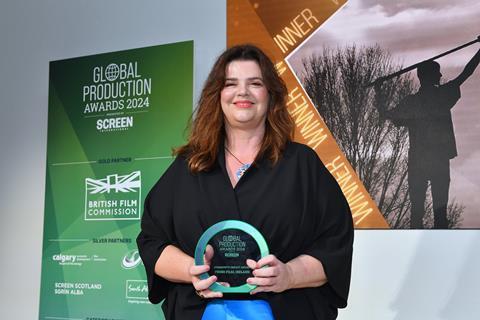
Awarded to a film commission or production that demonstrates commitment to the local community during filming, this category was hotly contested with a youth-driven submission winning out.
A registered charity, Fresh Film in Limerick, Ireland is an organisation dedicated to inspiring, nurturing and celebrating excellence in young people’s filmmaking. The centrepiece of its activities is the Fresh International Film Festival, which includes Ireland’s young filmmaker of the year awards, with categories for juniors (7-12 years), seniors (12-18 years) and an international section (7-18 years). Categories are open to individual filmmakers, schools, youth and community groups.
“Teaching the next generation of filmmakers at an early age allows the industry to grow from within the community,” noted one judge. “The hardest thing when growing up with a dream of filmmaking is how to get into what can be a very closed industry. [Fresh Film] allows for young people to get a taste and training.”
In its award tilt, Fresh Film ably demonstrated how it connected and worked with the local community in terms of recruitment, education and the environment, while also having a positive environmental and cultural conscience. “The entry is strong on training and Fresh Film has been around since 1997 so is clearly sustainable in the long term,” commented another judge.
A video of its activities was cited by another judge as showcasing a strong connection to its local community. “A clear link to the school curriculum is excellent as it demonstrates the environment being a consideration for filmmaking methodology,” they said.
Judges looked for evidence of positive impact on the community. They considered employment, training, long-term economic sustainability and testimonials or evidence of employment and skills generated by the production’s investment. One judge highlighted some of the big pluses that propelled Fresh Film to its win: it celebrates very young filmmakers (from age seven) and regional productions; a national broadcast of the projects made by the youngsters proves it is serious about showcasing the contributions; and the organisation presents a sustainability award.
Nominees
- NEOM Media Industries (NEOM, Saudi Arabia)n
- Working Together on a New Way Forward (Osiyo, Voices of the Cherokee People, US)
3. Diversity, Equity & Inclusion
Winner: Blood & Water (Gambit Films, South Africa)
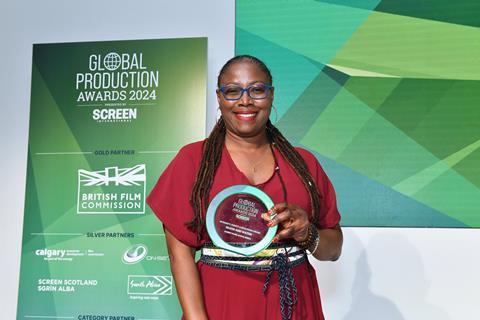
The victorious entry won over the judges from the get-go, demonstrating a commitment to diversity, equity, inclusivity and accessibility in their production crews and on set.
When Blood & Water premiered on Netflix, it redefined the standards for diversity on screen. The series follows a determined sister on a complex journey to locate her missing sibling. Featuring performances from emerging talents Ama Qamata and Khosi Ngema, it contributed to the viral #StrongBlackLead hashtag. The South African series showcases characters from diverse backgrounds, while being set in the world of an elite school and its affluent families.
Led by creators and producers from Gambit Films — Nosipho Dumisa-Ngoasheng, Travis Taute, Daryne Joshua, Benjamin Overmeyer, Bradley Joshua and Simon Beesley — the soul of the show and company springs from authentic experiences and voices of people of colour.
One judge pointed to “the soul of the show and company” line in the award submission as encapsulating the win for the production.
“From its inception, the series has placed an importance on initiatives aimed to advance equity and representation, cultivating an environment of respect, empathy and understanding,” noted another judge.
“This inclusive culture was nurtured by Netflix Africa’s commitment to creating non-prejudicial and safe sets, alongside Gambit Films’ dedication to employing people-of-colour creatives.”
Next, one judge is hoping for inclusivity for people with disabilities while another posted a desire for more representation from the north of Africa, too.
“By prioritising diversity both on and off screen, the series has challenged traditional narratives and has been a commercial success,” another impressed judge pointed out.
Judges also looked for fact-based submissions providing information about composition of cast and crew and other relevant information, with Blood & Water topping the list.
Nominees
- Below-the-Line Traineeship on Cocaine Bear (Universal Filmed Entertainment Group, US)
- Diversifying Native American Representation & Industry Opportunities (Cherokee Film, US)
- Little Bird (Fremantle, Rezolution Pictures and OP Little Bird, Canada)
- Queens (Wildstar Films, UK)
- Unseen (Gambit Films, South Africa)
- Zoe Ramushu (Wrapped, South Africa)
4. Emerging Location - Sponsored by Dallas Film Commission
Winner: Film AlUla, Saudi Arabia (Film AlUla)
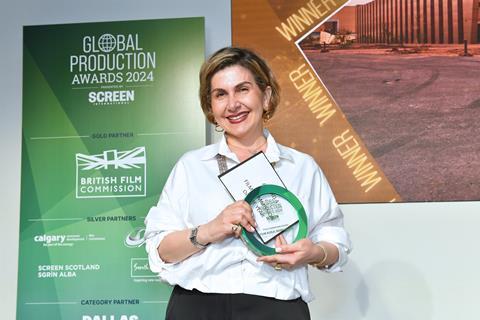
Several judges in this category boast extensive production experience, from big-budget studio pictures through independent international co-productions to projects for well-healed streamers — it put the onus on film commissions to bring fresh prospects to the table.
The aim was to reward a film commission that demonstrated an increase in the number of productions, attractive incentives, improved levels of service, a growing crew base and infrastructure, all amid a great variety of filming spots. Oh, and positive testimonials.
The winning entry, Film AlUla, is the Royal Commission for AlUla’s film agency, promoting and supporting production in the AlUla region, northwest Saudi Arabia. The untouched location opened to filming in 2020 and welcomes regional and international productions.
Described as “an impressive feat” by one judge, Film AlUla was heralded as a project into which its government has put time, effort and money. Film AlUla celebrated a milestone in 2023, securing a partnership with Stampede Ventures. The Hollywood independent is taking 10 productions to the region over three years, with a projected $350m spend. It is the biggest deal of its kind since the cinema ban in Saudi Arabia was lifted in 2018.
Judges noted that Film AlUla has hosted large-scale international features, including Gerard Butler-starrer Kandahar and Cherry, directed by Anthony and Joe Russo, alongside local productions such as Tawfik Alzaidi’s Norah, the first feature fully shot in AlUla. Last year, 123 projects were filmed there, spanning features, scripted and reality series, commercials, docs and music videos. In the words of one judge: “Two new state-of-the art soundstages and support facilities and a 10-picture co-funding deal with Hollywood is impressive.”
The judges sought evidence of the location’s problem-solving approach, customer service, creativity, community contribution and all the country has to offer — including information about crew, different locations and how they are accessed by productions and producers. “It has a film commission and demonstrated strong focus on building a sustainable ecosystem and collaboration,” noted one judge.
The positive testimonials from visiting filmmakers and talent such as Guy Ritchie and Sharon Stone also piqued the judges’ interest.
Saudi Arabia’s NEOM Media Industries was highly commended in the category.
Nominees
- NEOM, Saudi Arabia (NEOM Media Industries)
- Placer-Lake Tahoe, US (Placer-Lake Tahoe Film Office)
- Tampa Bay, US (Film Tampa Bay)
- Tirana, Albania (Tirana Film Office)
5. Film Commission of the Year
Winner: Film AlUla, Saudi Arabia
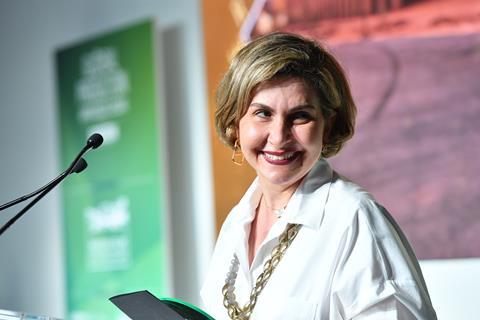
A quartet of commissions from across the globe vied for this award. The winning entry needed to have an established international reputation for exemplary service to productions, coupled with a top filming destination of choice.
Film AlUla, Saudi Arabia’s Royal Commission for AlUla’s film agency, won out in a closely contested category, with one judge describing it as simply “an impressive project and commission”.
Film AlUla promotes and supports film and TV production in AlUla county, northwest Saudi Arabia. The untouched location first opened its doors to filming in 2020, with the core objective of cultivating a sustainable film ecosystem, creating opportunities for young Saudis to pursue careers in this field. AlUla is home to approximately 40,000 people.
The requirements judges were looking for included commission-driven efforts to attract filmmakers, a problem-solving approach, customer service, creativity, community contribution and why the location is proving so popular.
One judge was impressed both by the commission and by AlUla’s open approach to the film and TV sector.
“Film AlUla continues to wow me,” said another, having helped vote Film AlUla to this year’s Emerging Location award. A further judge said AlUla’s efforts to attract filmmakers, and its problem-solving approach, were of the highest standard.
The judges also gave a highly commended badge of honour to Cherokee Film Commission in Oklahoma, US. It attracts film and media productions to the Cherokee Nation and connects filmmakers to assets within the reservation, including its film-friendly communities, diverse locations, film studios and tribal incentive, as well as its sought-after database representing Native American talent, crew, consultants and support services.
A state-of-the-art XR studio in Owasso, Oklahoma provided a place for Land Of Gold to film during the height of the pandemic. Director and writer Nardeep Khurmi said his producing team connected easily with the Cherokee Nation for the shoot.
Nominees
- Andalucia Film Commission, Spain
- Cherokee Film Commission, US
- Czech Film Commission, Czech Republic
6. Location of the Year
Winner: Juvet Landscape Hotel, Norway (Western Norway Film Commission)
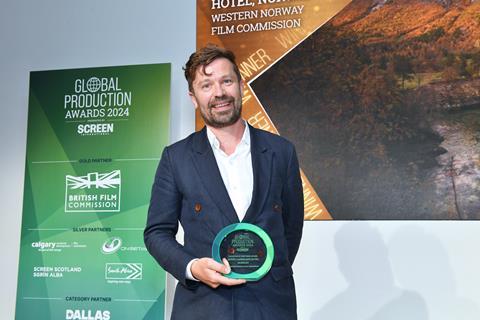
Awarded to a single location for its work across one or multiple film and TV productions, the winner stands out in a jaw-dropping crowd. The award was destined to go to a town, beach, church or office block as long as the location has shown its creative importance in the storytelling of productions.
The Juvet Landscape Hotel, facilitated by Western Norway Film Commission, first shot to fame as a signature location for Alex Garland’s Ex Machina, which filmed there and in the surrounding Valldal valley.
The hotel was reintroduced to audiences in the final season of HBO’s multi award-winning black comedy-drama Succession, created by Jesse Armstrong.
The impact of the location, its versatility and the support and services provided to producers who have used it were all considered by the judges.
One adjudicator summed up the Juvet Landscape Hotel win as “a solid example of how a unique landscape and architecture can be activated through filming activity to create an iconic location that bolsters tourism and brings additional production work”.
City locations were not eligible for this category, having been advised to enter the City of Film category.
Nominees:
- Orkney Islands, Scotland (Screen Scotland)
- West Horsley Place, UK (Location Collective)
7. Oustanding Use of Locations
Winner: Troll (Norwegian Film Commission, Norway)
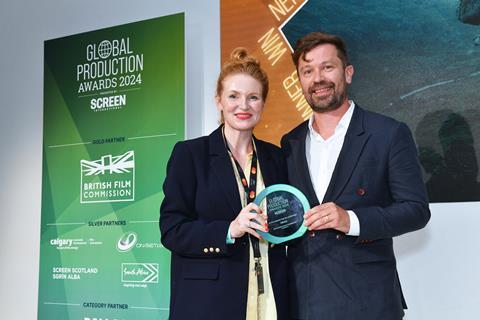
Awarded to a scripted production for its creative use of locations, this category rewards a production team’s endeavour to make a location, or locations, work for a scripted production, whether through a particular creative challenge or multiple location shoots.
There must be something about the northern European air — two of the three finalists vying for the plaudit landed from Norway, the other from South Africa.
The winner, Netflix production Troll, takes place in contemporary Norway. The non-English-language fantasy thriller centres on “something gigantic” that awakens and escapes from within the mountains of Dovre, after being trapped there for thousands of years. It destroys everything in its path and must be stopped before it reaches Oslo.
The judges looked at how the production team made locations work. They considered questions such as, were the locations doubling for other places? If so, how? How did they make the location meet the brief and what were the creative and operational solutions put in place that helped the producers get what they wanted?
Troll filmed entirely in Norway — unusually, almost all locations in the story played themselves, including the Unesco world heritage area of Geiranger, Jotunheimen national park, capital city Oslo, military bases, the parliament building and the underground lair of a castle.
“The complexity of the undertaking is impressive, and the collaboration with government, armed forces, private sector and others illustrates that operational solutions were found,” noted one judge.
In its winning submission, Norwegian Film Commission said mountains inspired the colour and texture of the troll character, with the peaks coming alive in the film, “as the troll explodes from the natural surroundings.”
As one judge noted, Troll is a product of making the most of landscapes and collaborating with partners and stakeholders all through production.
“The locations fit the fantasy of the film, clearly a creative challenge that was met,” commented another judge.
Filming took place across the west and east regions and the capital, while the three film commissions covering the shoot provided assistance.
“Incredible achievements in all ways [on] the most viewed non-English film on Netflix ever,” said one impressed judge. “The outstanding scenery is as much part of the story as the characters. The Norwegian Film Commission is extremely switched on to filming and results.”
Nominees:
- Ragnarok (Western Norway Film Commission, Norway)
- Wyfie (Homebrew Films, South Africa)
8. Physical Production Innovation
Winner: CAMA AssetCycle: Innovating Circularity (CAMA AssetStore, UK)
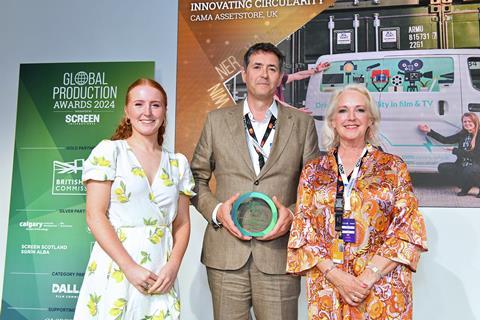
This award recognised an innovation that allows a physical production to be more sustainable and efficient in its operations, demonstrable by results in practice. The winning entry was required to show how a particular strategy supported the success of a production either creatively and/or through operational efficiencies or through improving sustainability.
One judge described winner CAMA AssetCycle as simply a “much-needed analytical tool for the industry”. CAMA’s combination of services across the field of asset management has enabled the company to develop AssetCycle, a pioneering new circular economy service. An industry-first offering, CAMA AssetCycle is making an impact on the carbon footprints of countless productions, including for Netflix, Universal, Paramount, Banijay, Sister, See-Saw Films, BBC Studios and Sky.
Helping the industry towards more circular practices, CAMA AssetStore has been working with productions to provide first-of-its-kind carbon data on the impact of reuse through its in-house redistribution service and Circular Economy certification. The data is powered by a bespoke, Greenhouse Gas Protocol-aligned Life Cycle analysis calculator, forecasting the emissions avoided through asset reuse versus what would have been produced had everything been new and then sent to landfill.
The judges were uniformly impressed. “This business model seems to help the environmental impact of a production [through] access to materials, props etc to help smaller productions increase their creative scope,” said one judge. “It also provides a service that allows productions to store and catalogue [assets] for future productions, rather than just trash and start again.”
The judges were enthused by CAMA’s aim to make the process of reducing waste and carbon footprints and accounting calculations as easy as possible. “An outstanding entry and a sophisticated yet grounded business,” said one. “The combination of assets is impressive, from the traditional bricks-and-mortar AssetStore offering, to the AssetFlow asset management digital platform, and AssetCycle, the circular economy management service. CAMA seems to have thought of everything.”
Nominees
- Evergreen Prisma (Lower Austrian Film Commission, Austria)
- Food Waste Heroes Programme (Olio, UK)
- Hybrid Generator Initiative (On-Set Location Services, UK)
- Powering Innovation with Hybrid Solutions (Neptune Sustainability, UK)
9. Studio of the Year
Winner: Sunset Studios, US
The studio of the year award was joint top in terms of shortlisted submissions, with eight facilities spanning the UK, Europe, Canada and the US in contention.
Awarded to a studio complex for adaptability and outstanding service to productions, the winner had to demonstrate delivery to the highest level for productions, innovating and at the same time delivering for the local community in which it works.
Sunset Studios in Los Angeles, California boasts production facilities, soundstages and production services, while Quixote by Sunset Studios provides production services, with an expansive fleet of trailers, trucks and other vehicles, lighting/grip and supplies/expendables. It also offers personalised concierge-style support and on-the-ground problem-solving for productions, while the judges were impressed by a commitment to advancing sustainability and helping clients reduce their carbon footprint.
Another boast is using the produce grown from vertical gardens at onsite commissaries, while donating surplus to local non-profits. Sunset has installed fridges for crews to drop off leftovers from catering — the pre-packaged meals are then distributed to those in need by organisations such as the Hollywood Food Coalition.
One judge praised the focus on avoiding food waste. “[Sunset] also has a solid community programme and partnerships with a few emerging non-profits.” Another judge cited the work with local communities and the initiatives it has undertaken. “I’m impressed with the focus on their staff being at the heart of the support offered to productions.”
Sunset Studios and Quixote clients include Netflix, Disney and Paramount+, among others. Client testimonials attested to the studio’s professionalism, customer attraction and service, creativity, sustainability and community focus.
Nominees
- Garden Studios, UK
- Origo Studios, Hungary
- Provence Studios, France
- Sky Studios Elstree, UK
- Studio Fares, Sweden
- Vancouver Film Studios, Canada
- Versa London Studios, UK
10. Sustainability Initiative
Winner: Ecology (Provence Studios, France)
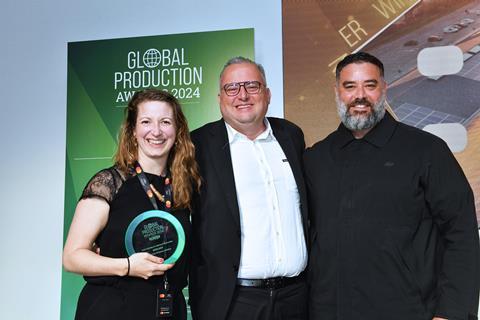
The Sustainability Initiative category was the joint most hotly contested category (alongside Studio of the Year), with eight shortlisted submissions. To secure the award, a film commission, office or production studio had to detail an outstanding single green initiative, demonstrable by results. The judges were tasked with looking for an individual initiative that was a big idea making a difference to one area or element of the production process, leading to tangible, environmentally friendly results.
The winner — Provence Studios in France, with Ecology — demonstrated its eco ethos with the installation of 30,000 square metres of photovoltaic panels across its facilities, generating a whopping 3.6 megawatts of electricity. It ‘lit up’ the category and provided ample evidence of how a particular initiative, idea or innovation delivered measurable and defined benefits to the environment and community. The facility also has systems to harvest rainwater that is used for various purposes, such as filling production tanks and firefighting; and onsite sustainable transportation solutions, with maintenance teams using electric vehicles for daily operations and charging stations in its parking lots.
Provence Studios has also invested in state-of-the-art equipment such as the Rotaclean, so painters can clean brushes without polluting wastewater with paint residue. This reflects the studio’s holistic approach to waste management, ensuring that even the smallest details are measured in the pursuit of sustainability.
The judges were also impressed by the studio’s commitment to sustainability extending beyond its physical operations to include innovative solutions for the production processes. “A totally eco-friendly environment to make film and TV,” said one judge, a production veteran. “It starts out on the right foot and every effort is supported and favourable to build upon for productions.”
There is also a virtual set, helping reduce the need for location shoots and carbon emissions associated with travel. Set decorations are recycled for future use, and the studio even partners with TchaoMégot to recycle cigarette butts.
One judge described the initiative from Provence Studios as a “well-thought-through strategy for the entertainment industry. It encompasses renewable energy, waste reduction, biodiversity conservation and community engagement — both physical and production processes.”
Nominees
- Evergreen Prisma (Lower Austrian Film Commission, Austria)
- Food Waste Heroes Programme (Olio, UK)
- Green Film Update — a European Public Consultation (Trentino Film Commission, Italy)
- GreenerLight Program (Universal Filmed Entertainment Group, US)
- GREENSET (GREENSET, Atlantic Studios & Homebrew Films, South Africa)
- Solar All-Electric Verde Trailers (Quixote by Sunset Studios, US)
- The Grid Project (Film London, UK)
11. Sustainable Production (scripted)
Winner: True Detective: Night Country (Warner Bros Discovery, HBO, US)
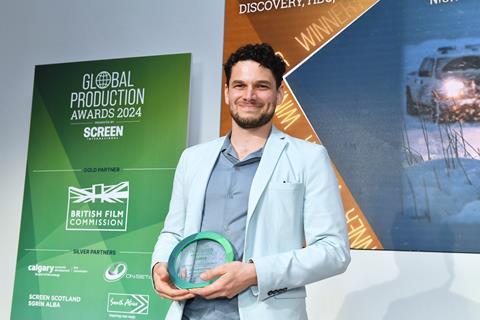
Awarded to an individual scripted production showcasing best practice in sustainable, green filming, this newly created category demands evidence of a delivered plan on sustainability with measurable contributions to carbon reduction and/or offsetting and benefits to the environment and location/community.
True Detective: Night Country, the winning entry from Warner Bros Discovery/HBO, stood out in one important way. “A key theme in the show revolves around a climate-
related issue and related protests,” said one judge. “Including this storyline in the highly regarded True Detective franchise brings conversations to living rooms, workplaces and friendship groups worldwide.”
“Rolling sustainability into the narrative is an important and easy way to help make greater change,” noted another judge.
Night Country wove eco-conscious practices into every phase of production, from the drawing board to the final cut. It extended beyond crew, involving suppliers, encouraging the adoption of green innovative solutions, and spanning fuel, energy, materials and waste management systems.
Filming in Iceland, the production took advantage of the country’s 100% renewable energy grid, avoiding the use of fuel generators as much as possible.
The judges were impressed with the production committing fully to co-ordination and planning to manage its power usage. A new-to-Iceland electric battery unit was used to reduce the run time of diesel generators, on location and for studio crew parking. In total, 75.7% of power came from renewable energy sources.
The carbon footprint from Icelandic renewable energy is approximately 3,000% lower than power from diesel generators, so without this pre-planning the carbon footprint for the production would have been a great deal higher.
“A great entry. The production thought through the end-to-end process with detailed co-ordination, tapping into the renewable energy grid,” said one judge.
Another added: “This was a sophisticated and well thought-out sustainability plan that engaged with all facets of the production team and workflow.”
Nominees
- Abigail (Universal Filmed Entertainment Group, US)
- Belgravia: The Next Chapter (Carnival Films, UK)
- Hijack (60Forty Films & Idiotlamp Productions in association with Apple TV+, UK)
- Paranoia (SF Studios Production, Denmark)
12. Sustainable Production (unscripted)
Winner: A League Of Their Own (CPL, Picture Zero & Sky, UK)
This category was open to producers, studios, production companies or teams, and was given to an individual unscripted production that showcases best practice in sustainable, green filming — with the same rigorous requirements applied to submissions as the scripted sustainable production category listed above.
The winning entry had to provide evidence of how the production delivered a plan on sustainability with measurable contribution to carbon reduction and/or offsetting and benefits to the environment and location or community.
In its winning bid, Sky’s comedy panel sports show A League Of Their Own detailed its desire to take action to reduce the programme’s carbon footprint, which had been rising steadily post-Covid. Working alongside consultants Picture Zero, the CPL production team delivered a whopping 47% reduction in carbon compared to the previous season.
One judge described the reduced emissions as commendable and noted that data played an important role in the planning stages to satiate the production’s desire to reduce its carbon footprint.
The production’s move to become zero waste to landfill was also a hit with the judges. Through working with organisations such as PropUp UK, which distributes leftover inventory from the art department to local community projects, nothing went to waste and everything found a meaningful new home.
Wardrobe items were donated to a village in Ghana. Even a life-size statue of panelist and former England footballer Jill Scott was donated to Gatehead College.
“There was great focus on waste in partnership with community and global organisations, including the one in Ghana,” said one judge. “Electric vehicles and public transportation was used, while the studio used 100% renewable energy. Sustainability was present in every aspect of production planning.”
The submission pointed the judges to an episode that featured UK TV personality Big Zuu rapping about bottled water and sustainability, putting the environmental agenda right into the show.
Nominees
- The Coronation Concert (BBC Studios Events, UK)
- The Cottage Dream (Strix, Norway)
13. Virtual Production Innovation
Winner: Oracle Red Bull Racing Campaign (Final Pixel, XPLOR/Production Park, UK)
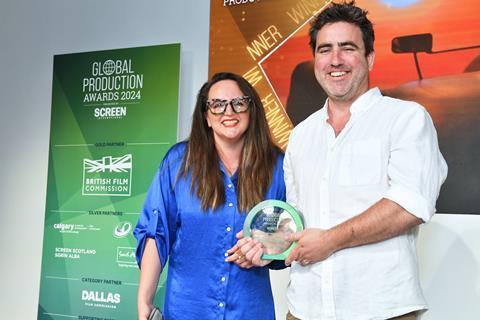
A new category for the second outing of the GPAs, the virtual production (VP) innovation plaudit is awarded to a company or studio that demonstrates how they have best used the technology in a film or TV production.
Contenders were asked to highlight how VP has improved the efficiency of workflows and minimised the environmental impact of a production, while producing a high-quality, engaging storytelling experience.
The winner — Oracle Red Bull Racing Campaign from Final Pixel, XPLOR/Production Park, UK — emerged from a seven-strong field of shortlisted candidates.
Final Pixel has transformed traditional production methods by using Unreal Engine’s virtual environments. Not only has it looked to modernise traditional methods but it also plays a pivotal role in promoting sustainable practices, contributing to global environmental goals by reducing carbon emissions. The need for physical travel or set construction is reduced significantly by utilising virtual environments built digitally through Unreal Engine.
Entrants were asked to demonstrate how they drive creativity and innovation through VP, and help define new best practices. Final Pixel says the use of Unreal Engine enables brands to adopt an approach that allows for creative campaigns with global reach while facilitating the servicing of multiple territories from a single location.
Final Pixel is committed to guiding advertisers towards carbon net zero status. At the beginning of 2023, it crafted a promotional campaign that ‘drove’ Oracle Red Bull Racing’s RB19 F1 car from Manhattan in Nevada to Manhattan in New York — all from the comfort of a studio in Yorkshire, England.
“Final Pixel is a brilliant VFX business at the cutting edge of technology,” noted one judge, while another marvelled at the “amazing use of virtual locations”. Another judge said the case study was a novice-friendly way to explain just why virtual production was essential to this project.
Final Pixel also turned heads with its push for an inclusive and diverse creative landscape. “With a commitment to diversity, inclusivity and innovation, Final Pixel aims to lead the way in transforming VP over the next three years.” The firm aims to promote equality and authenticity in storytelling by empowering artists from diverse backgrounds, including those with disabilities.
Nominees
- ARRI Stage London (ARRI Stage London, UK)
- Curiosity (MBC Audiovisuales, Spain)
- Fallout (MBSi, UK and US)
- Real-Time Remote: 5G Virtual Production Breakthrough (Abertay University, Royal Holloway University of London — StoryFutures, Space Digital, TayScreen+Tay Cities Deal & Scotland 5G Centre, UK)
- Scan Pilot Virtualisation (ReadySet Studios, Netherlands)
- The Next Stage (La Planète Rouge, France)
14. Special Recognition
Winner: Bafta albert
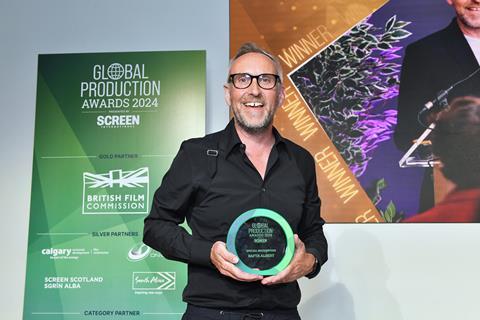
Bafta albert, a leading screen industry organisation for environmental sustainability, was given a special recognition award at the GPAs.
Founded in 2011, Bafta albert supports the film and TV industry in reducing the environmental impact of production while creating content that sets a vision for a sustainable future.
The work of albert is underpinned by the Screen Industry Climate Action Blueprint, a framework to be used by industry in support of transition to a net-zero, nature-positive society, and creating meaningful sustainable change.
The blueprint is made up of four key areas: Off-screen actions, focused on helping those in production make choices to reduce their emissions at all stages of production — from development through filming to post-production.
Culture and capability, aimed at empowering people with the tools to make informed decisions and understand the unique challenges the industry faces in going green.
Standards, measurement and reporting, levelled at providing the tools needed to track activity and identify opportunities for progress.
Content and storytelling, focused on working with commissioners and writers to unearth stories across all genres that build public awareness of the climate crisis and inspire action.
Off screen, albert provides expert advice, guides and decarbonisation programmes. Its Creative Energy programme, which relaunches later this year, will provide a direct route to 100% green energy at a competitive price for any business or individual working in the industry.
Best known is probably the albert carbon calculator, which productions can use to track their carbon footprint and make informed decisions about how to reduce their impact. The carbon calculator alongside the carbon action plan are part of an albert toolkit that must be implemented for productions to receive albert certification.
In 2023, more than 3,000 productions completed their footprints and 2,451 productions received certification. UK certifications numbered 2,122 with the remaining 329 issued to international projects.















![[L-R]: Amanda Villavieja, Laia Casanovas, Yasmina Praderas](https://d1nslcd7m2225b.cloudfront.net/Pictures/274x183/6/4/1/1471641_pxl_20251224_103354743_618426_crop.jpg)






![[L-R]: Amanda Villavieja, Laia Casanovas, Yasmina Praderas](https://d1nslcd7m2225b.cloudfront.net/Pictures/100x67/6/4/1/1471641_pxl_20251224_103354743_618426_crop.jpg)


No comments yet